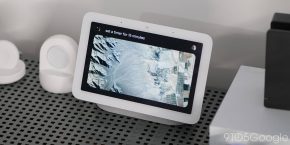
Google is now rolling out a Fuchsia-based update for the second-generation Nest Hub, marking the third device to officially run on the homegrown operating system.
After years of development on its own from-scratch, not-Linux operating system, Google officially launched Fuchsia in 2021 by way of an update for the original Nest Hub smart display. Despite changing out the entire underlying system, the core smart display experience remained relatively unchanged. Last year, the larger Nest Hub Max followed a similar upgrade path, picking up Fuchsia without making the change obvious to the everyday smart display owner.
Today, Google tells us that the second-generation Nest Hub – released in 2021 and equipped with a Soli radar sensor for sleep tracking – is now gaining a Fuchsia update of its own. As before, the new OS will roll out slowly, starting with a small percentage of those enrolled for Preview Program updates in the Google Home app. After a few months of public testing, the update should become more widely available.
No surprise, Google is once again aiming for this update to go relatively unnoticed, as there will be no changes to the feature set of the Nest Hub (2nd Gen). The best way to know if your smart display has been updated is to check the version number, whether on the display itself or in the Google Home app. If the “Technical information” page in Settings lists a “Fuchsia version,” then your Nest Hub has been updated.
This latest Fuchsia upgrade makes sense and is one we’ve been long anticipating. Once complete, all three of Google’s current smart displays will have been updated from Cast OS to Fuchsia.
That said, the timing is quite curious, given the forthcoming release of the Pixel Tablet, an Android-powered device that’s set to supersede the Nest Hub series. Relatedly, Google has discontinued updates for third-party smart displays, while Nest Hub displays are set to lose numerous Assistant-powered apps and games later this year.
Looking ahead, we’ve already got a decent idea of where the Fuchsia project is headed next once all smart displays have been updated. Fittingly, the operating system is set to replace the Linux-based Cast OS once more, this time on Nest speakers.
Of course, longtime followers of the project know that Fuchsia has the potential to be useful for far more than just smart home usage. It’s actively being developed as a “general-purpose” operating system, like Windows, Linux, and macOS. The company is even actively developing a way to run Linux and Android apps “natively” on Fuchsia.
With any luck, the Nest ecosystem will just be a stepping stone and a proving ground for Fuchsia before moving on to other uses.
In its statement, Google touched on Fuchsia’s broader goals and emphasized its “long-term” nature while also encouraging developers to learn more about Fuchsia from the official website.
Fuchsia is a long-term project to create a general-purpose, open source operating system, which we have been developing in the open for years. This is part of those continued efforts, and fuchsia.dev will have the latest information on the team’s work.
– Google Spokesperson
Read more:
- With the Pixel Tablet, Google has come full circle on smart displays
- Google accidentally reveals an upcoming device will launch with Fuchsia
- Upcoming Nest speaker should bring UWB, matching Handoff on Apple’s HomePod
FTC: We use income earning auto affiliate links. More.


Comments